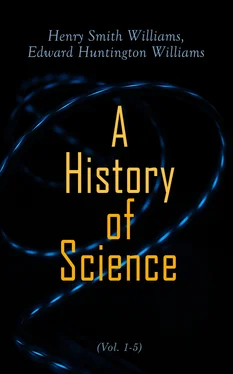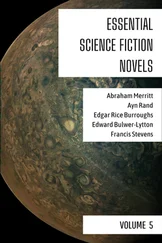The mind that could conceive the world as a sphere and that interested itself in weights and measures was, obviously, a mind of the visualizing type. It is characteristic of this type of mind to be interested in the tangibilities of geometry, hence it is not surprising to be told that Pythagoras "carried that science to perfection." The most famous discovery of Pythagoras in this field was that the square of the hypotenuse of a right-angled triangle is equal to the squares of the other sides of the triangle. We have already noted the fable that his enthusiasm over this discovery led him to sacrifice a hecatomb. Doubtless the story is apocryphal, but doubtless, also, it expresses the truth as to the fervid joy with which the philosopher must have contemplated the results of his creative imagination.
No line alleged to have been written by Pythagoras has come down to us. We are told that he refrained from publishing his doctrines, except by word of mouth. "The Lucanians and the Peucetians, and the Messapians and the Romans," we are assured, "flocked around him, coming with eagerness to hear his discourses; no fewer than six hundred came to him every night; and if any one of them had ever been permitted to see the master, they wrote of it to their friends as if they had gained some great advantage." Nevertheless, we are assured that until the time of Philolaus no doctrines of Pythagoras were ever published, to which statement it is added that "when the three celebrated books were published, Plato wrote to have them purchased for him for a hundred minas."(2) But if such books existed, they are lost to the modern world, and we are obliged to accept the assertions of relatively late writers as to the theories of the great Crotonian.
Perhaps we cannot do better than quote at length from an important summary of the remaining doctrines of Pythagoras, which Diogenes himself quoted from the work of a predecessor.(3) Despite its somewhat inchoate character, this summary is a most remarkable one, as a brief analysis of its contents will show. It should be explained that Alexander (whose work is now lost) is said to have found these dogmas set down in the commentaries of Pythagoras. If this assertion be accepted, we are brought one step nearer the philosopher himself. The summary is as follows:
"That the monad was the beginning of everything. From the monad proceeds an indefinite duad, which is subordinate to the monad as to its cause. That from the monad and the indefinite duad proceed numbers. And from numbers signs. And from these last, lines of which plane figures consist. And from plane figures are derived solid bodies. And from solid bodies sensible bodies, of which last there are four elements—fire, water, earth, and air. And that the world, which is indued with life and intellect, and which is of a spherical figure, having the earth, which is also spherical, and inhabited all over in its centre,(4) results from a combination of these elements, and derives its motion from them; and also that there are antipodes, and that what is below, as respects us, is above in respect of them.
"He also taught that light and darkness, and cold and heat, and dryness and moisture, were equally divided in the world; and that while heat was predominant it was summer; while cold had the mastery, it was winter; when dryness prevailed, it was spring; and when moisture preponderated, winter. And while all these qualities were on a level, then was the loveliest season of the year; of which the flourishing spring was the wholesome period, and the season of autumn the most pernicious one. Of the day, he said that the flourishing period was the morning, and the fading one the evening; on which account that also was the least healthy time.
"Another of his theories was that the air around the earth was immovable and pregnant with disease, and that everything in it was mortal; but that the upper air was in perpetual motion, and pure and salubrious, and that everything in that was immortal, and on that account divine. And that the sun and the moon and the stars were all gods; for in them the warm principle predominates which is the cause of life. And that the moon derives its light from the sun. And that there is a relationship between men and the gods, because men partake of the divine principle; on which account, also, God exercises his providence for our advantage. Also, that Fate is the cause of the arrangement of the world both generally and particularly. Moreover, that a ray from the sun penetrated both the cold aether and the dense aether; and they call the air the cold aether, and the sea and moisture they call the dense aether. And this ray descends into the depths, and in this way vivifies everything. And everything which partakes of the principle of heat lives, on which account, also, plants are animated beings; but that all living things have not necessarily souls. And that the soul is a something tom off from the aether, both warm and cold, from its partaking of the cold aether. And that the soul is something different from life. Also, that it is immortal, because that from which it has been detached is immortal.
"Also, that animals are born from one another by seeds, and that it is impossible for there to be any spontaneous production by the earth. And that seed is a drop from the brain which contains in itself a warm vapor; and that when this is applied to the womb it transmits virtue and moisture and blood from the brain, from which flesh and sinews and bones and hair and the whole body are produced. And from the vapor is produced the soul, and also sensation. And that the infant first becomes a solid body at the end of forty days; but, according to the principles of harmony, it is not perfect till seven, or perhaps nine, or at most ten months, and then it is brought forth. And that it contains in itself all the principles of life, which are all connected together, and by their union and combination form a harmonious whole, each of them developing itself at the appointed time.
"The senses in general, and especially the sight, are a vapor of excessive warmth, and on this account a man is said to see through air and through water. For the hot principle is opposed by the cold one; since, if the vapor in the eyes were cold, it would have the same temperature as the air, and so would be dissipated. As it is, in some passages he calls the eyes the gates of the sun; and he speaks in a similar manner of hearing and of the other senses.
"He also says that the soul of man is divided into three parts: into intuition and reason and mind, and that the first and last divisions are found also in other animals, but that the middle one, reason, is only found in man. And that the chief abode of the soul is in those parts of the body which are between the heart and the brain. And that that portion of it which is in the heart is the mind; but that deliberation and reason reside in the brain.
"Moreover, that the senses are drops from them; and that the reasoning sense is immortal, but the others are mortal. And that the soul is nourished by the blood; and that reasons are the winds of the soul. That it is invisible, and so are its reasons, since the aether itself is invisible. That the links of the soul are the veins and the arteries and the nerves. But that when it is vigorous, and is by itself in a quiescent state, then its links are words and actions. That when it is cast forth upon the earth it wanders about, resembling the body. Moreover, that Mercury is the steward of the souls, and that on this account he has the name of Conductor, and Commercial, and Infernal, since it is he who conducts the souls from their bodies, and from earth and sea; and that he conducts the pure souls to the highest region, and that he does not allow the impure ones to approach them, nor to come near one another, but commits them to be bound in indissoluble fetters by the Furies. The Pythagoreans also assert that the whole air is full of souls, and that these are those which are accounted daemons and heroes. Also, that it is by them that dreams are sent among men, and also the tokens of disease and health; these last, too, being sent not only to men, but to sheep also, and other cattle. Also that it is they who are concerned with purifications and expiations and all kinds of divination and oracular predictions, and things of that kind."(5)
Читать дальше












